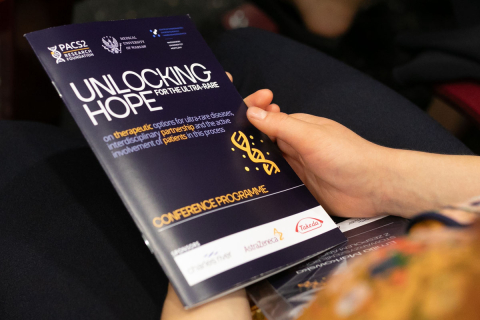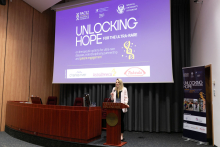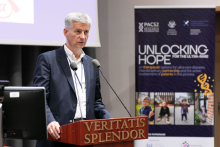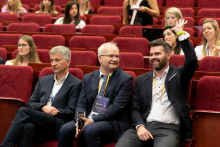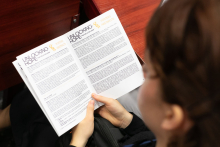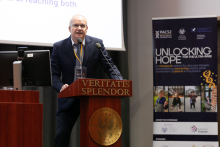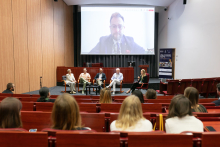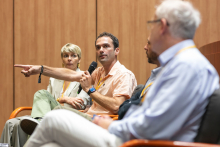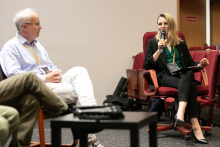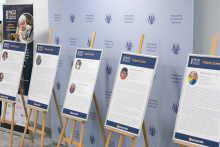- Among other activities, our university also focuses on rare diseases. It's a truly unique place because we can offer patients and their families integrated care: from the very beginning, from the prenatal period through early childhood to adulthood - said Prof. Piotr Pruszyczk, Vice Rector for Science and Technology Transfer, at the opening of the conference.
Professor Pruszczyk also emphasized the research potential of our university.
- We have the opportunity to conduct advanced scientific research in the areas of genomics and metabolomics, among others. Therefore, I am happy that the Center of Excellence for Rare and Undiagnosed Diseases MUW has decided to co-organize such a conference together with the PACS2 Research Foundation. I am confident that the conference will be fruitful and allow all of us to gain unique knowledge, as well as provide a platform for active discussion.
The purpose and significance of the conference
It is estimated that 2-3 million Poles suffer from rare diseases. One of those affected by such a disease is several-year-old Lena, daughter of Małgorzata and Piotr Kośla. Lena suffers from this epileptic and developmental encephalopathy 66 caused by a mutation in the PACS2 gene. In 2022, the girl's parents founded the PACS2 Research Foundation and began actively working to develop the first-ever treatment for this ultra-rare neurodevelopmental disorder. Because, as they report on the conference website, 95% of Polish patients with rare diseases have no available treatment. That's where the idea for the conference came from - to enable, on the basis of experience and work on PACS2, a debate about how essential it is for patients with (ultra)rare diseases to cooperate and involve themselves, their families and patient organizations in research.
- We need to work together by talking and putting the patient at the center of everything - explained Małgorzata Kośla at the opening of the conference - Not because it is required by law, but because these people have answers to key questions. Patients and their families who want to be part of the research being conducted have the courage to speak about their situation for the benefit of others. This courage deserves our deepest appreciation, but above all our interest and curiosity.
- While rare disorders have so far attracted public attention, these “rarer-than-rare patients” are in many cases still anonymous - stressed in turn Krzysztof Szczałuba, MD, PhD, Director of the Center of Excellence for Rare and Undiagnosed Diseases MUW- Needless to say, we all have a huge job to do to change this. Public recognition is one thing, but at the same time we must remember that our first and foremost goal is to find and improve care for patients with ultra-rare diseases.
Krzysztof Szczałuba, MD, PhD, points out another very important thing: that every person who participates in the diagnosis and/or treatment of a person with a rare disease has a chance to undergo a transformation that will make him a better and more effective professional in his field.
The role of the Center of Excellence for Rare and Undiagnosed Diseases MUW
Krzysztof Szczałuba, MD, PhD, also presented the activities of the Center of Excellence for Rare and Undiagnosed Diseases MUW, which was established in 2021 and is now one of the leading centers in the country prepared to care for patients suffering from (ultra)rare diseases.
- The Center of Excellence for Rare and Undiagnosed Diseases MUW is trying to help patients, just as the PACS2 Foundation does – Krzysztof Szczałuba, MD, PhD, said. And he emphasized: - There is still some portion of rare diseases that are undiagnosed, have no name, but need treatment. Therefore, the Center has two priority goals: to advance science and to develop clinical activities.
To do this, the Center integrates researchers and clinicians from different disciplines, facilitating grants, shortening the path and time to diagnosis, and offering integrated and complete medical care.
Krzysztof Szczałuba, MD, PhD: - One example of the Center's work is to try to fill the gap that opens up when a child with a rare disease leaves a neonatology clinic - with or without a diagnosis - and it's still early enough for the child to receive pediatric care. So we're trying to fill that gap by developing a unit for children under two years old, which is part of the Department of Neonatology and Rare Diseases UCC MUW.
Speaking about cooperation with various MUW departments and units, including those involved in neurodiagnostics and neurogenetics, the Center's director pointed to the need for good laboratory facilities, which are crucial when it comes to rare and ultra-rare diseases.
- Not a week goes by in which I don't meet a new patient with a condition I haven't encountered before - he stressed.
Key topics of the conference
During the first session, experts spoke primarily about PACS2 syndrome in the context of drug screening, metabolic lesion search, RNA and targeted therapy, protein degradation disorders in rare diseases, nucleic acid therapy, among others.
The patient-led model for treating very rare diseases in research collaborative networks was also presented, they talked about how patients can be involved in rare disease research, how European reference networks can support dispersed patients.
The panel discussion: how to enhance collaboration and attract patients to the “research table”
It was attended by: Krzysztof Szczałuba, MD, PhD, Dr. Ethan Perlstein of Perlara PBC from the United States, Tomasz Grybek of Borys the Hero Foundation/ Eurordis, Prof. Carlo Rinaldi of Oxford University and Dr. Daria Julkowska of the European Joint Program for Rere Diseases.
Dr. Ethan Perlstein, when asked what he thought was key for families to establish effective collaborations with researchers, emphasized three factors: courage and treating oneself as a partner in the discussion, good coordination and collaboration with families of other patients affected by the same condition, as well as capital and a plan for raising funds.
Prof. Carlo Rinaldi said in turn that scientists, even from the world's best laboratories, cannot conduct effective research alone. They need to open up to other researchers, to patients and their families, to national and international collaborations.
- The more I get out of my comfort zone, the better. I think rare diseases are more likely to provide this opportunity than other diseases - said Prof. Rinaldi.
- The patient, as a partner, both in the process of determining future calls and in the evaluation of the study, is an integral role in the whole process, and I believe there will be more and more projects that will be successful because the patient will be part of the whole journey - Dr. Daria Julkowska noted in turn.
The experts from Poland and abroad
In addition, symposium participants included: Prof. Gary Thomas of the University of Pittsburgh, Dr. Krzysztof Drabikowski of the Institute of Biochemistry and Biophysics of the Polish Academy of Sciences, Prof. Mariusz Więckowski of the M. Nencki Institute of Experimental Biology of the Polish Academy of Sciences, Dr. Alicia Guemez-Gamboa of the Northwestern University, Prof. Steve Murray of The Jackson Laboratory, Dr. Maciej Janik of the Department of Hepatology, Transplantology and Internal Diseases UCC MUW/ ERN-RARE LIVER, Dr. Kacper Łukasiewicz, an employee of the Center for Experimental Medicine and the Department of Psychiatry at the Medical University of Bialystok, Ambra Speciale of the University of Oxford.
The conference was held on September 4-5 at the Teaching Center MUW.
